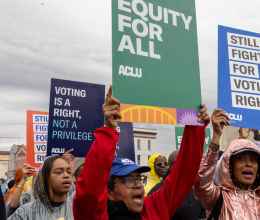
I was born in South Florida, of Guatemalan descent. I grew up in West Palm Beach, in a neighborhood known as Broadway, where many other Guatemalans lived. Local police often stopped cars driven by our neighbors for no other reason than to check people’s documents. It was an act of racial profiling; the offense they were guilty of was known as “driving while brown.” One day it was my father who was stopped.
He had been in the U.S. 22 years, had committed no crimes, had worked hard, now had a job as a driver transporting landscapers and had five U.S.-born children. My mother was a legal permanent resident and my father had applied for the same status. He was still trying to get it.
The local police who stopped him on the street discovered a 17-year-old deportation order from immigration authorities, issued only due to his lack of immigration documents. They had no reason to believe my father was a danger to anyone given his long, peaceful residence in West Palm Beach, but they reported him to ICE agents anyway. My father was deported, forced to leave his wife and five children behind. He promised to come back to us.
He never made it. Four years later the Guatemalan Consulate in Texas examined the teeth in a skull found in the desert and identified those remains as my father’s. He had died trying to reunite with us. The day we heard he was dead was the saddest of our lives. He was the backbone of our family.
What did local police achieve through this act of racial profiling? Did they protect anyone from anything? No, they didn’t. They left five U.S. citizen children without a father and my mother, a legal resident, widowed. An American-owned company lost a trusted employee. All they achieved was that they created suffering; it was all so unnecessary. Here’s hoping the case of my family leads local city officials to help protect their immigrant residents and leads local law enforcement to think twice before they act in ways that can bring tragedy to people’s lives.



